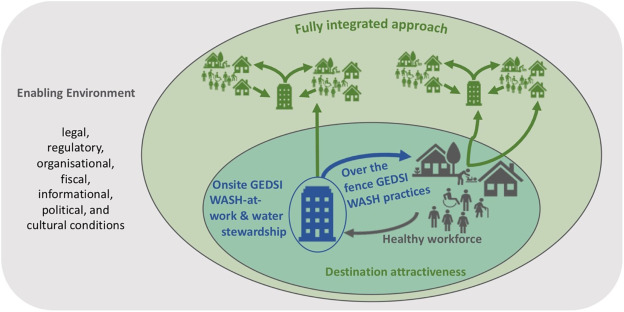
- Research project
- – Western Pacific
As the world emerges from a COVID-19 slumber, there is an opportunity for tourism to integrate Sustainable Development Goals 5 and 6 into the recovery phase through gender and socially inclusive water, sanitation and hygiene (WASH), according to a research project published by the IWC ‘Engaging corporate actors in Inclusive WASH’ research team.
IWC Team Leader Bronwyn Powell said the paper explored how gender and socially inclusive WASH in tourism can support not just hotels, workers and visitors, but begin to improve sustainable tourism practices and livelihoods of communities at the destination scale.
“Sustainable tourism development, including tourism’s COVID-19 recovery, requires a holistic view of environmental and community benefits, including access to water, sanitation and hygiene (WASH),” Bronwyn said.
The study of existing WASH practices in hotels in Mandalika, Indonesia, presents a system-wide Inclusive WASH in tourism framework for destinations. This can assist practitioners, government and community organisations to develop a tourism industry that deliver benefits ‘over the fence’ to local communities and the environment. Using a qualitative approach including interviews and focus groups, the framework is applied at three system scales: hotels, the community and wider destination to assess the current WASH situation in Mandalika, a water-scarce destination earmarked for rapid development.

The paper provides three opportunities to address challenges and deliver improved, destination-wide Inclusive WASH outcomes through hotels:
Addressing inequitable planning processes, improving stakeholder engagement and creating tools for hotels to improve Inclusive WASH can contribute to improving destination value.
Johanna Loehr, now on maternity leave, led the paper along with Indonesian colleagues and Anindrya Nastiti, as well as Dr Helen Johnson and Wade Hadwen, Utami Dwipayanti, Anindrya Nastiti, and Bronwyn Powell. The team represents a fruitful partnership between tourism and water researchers in Australia, Indonesia and also Fiji.
The research is moving beyond the academic realm, with the team now developing training materials. Training in use of the framework for hotels will get underway in October in Mandalika, and in the adjacent case study area of Labuan Bajo in November.